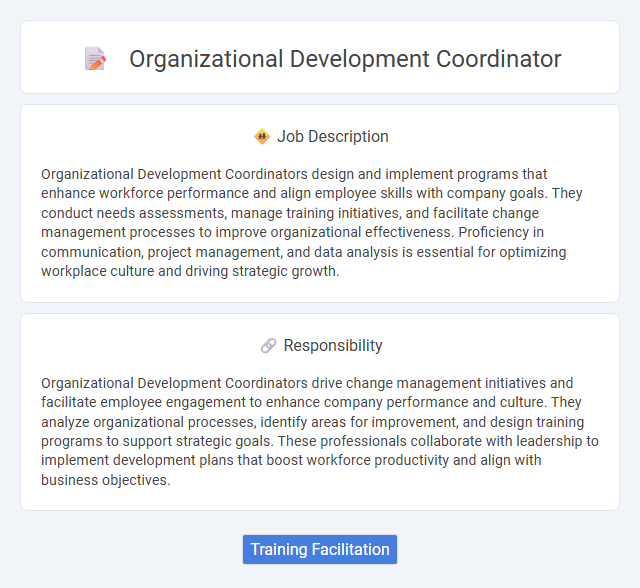
Organizational Development Coordinators design and implement programs that enhance workforce performance and align employee skills with company goals. They conduct needs assessments, manage training initiatives, and facilitate change management processes to improve organizational effectiveness. Proficiency in communication, project management, and data analysis is essential for optimizing workplace culture and driving strategic growth.
Individuals who are adaptable, empathetic, and possess strong communication skills are likely to thrive as Organizational Development Coordinators. Those comfortable with change management and employee engagement processes may find the role aligns well with their strengths and career goals. Candidates who prefer routine tasks or limited interpersonal interaction might face challenges in this dynamic, people-centered position.
Qualification
An Organizational Development Coordinator typically holds a bachelor's degree in human resources, organizational psychology, business administration, or a related field, with many employers preferring candidates to have a master's degree for advanced roles. Proficiency in change management, data analysis, and project management software is essential, alongside strong interpersonal and communication skills to facilitate employee development and organizational effectiveness. Experience in designing training programs, conducting needs assessments, and leading strategic initiatives is highly valued in this role.
Responsibility
Organizational Development Coordinators drive change management initiatives and facilitate employee engagement to enhance company performance and culture. They analyze organizational processes, identify areas for improvement, and design training programs to support strategic goals. These professionals collaborate with leadership to implement development plans that boost workforce productivity and align with business objectives.
Benefit
An Organizational Development Coordinator likely enhances company efficiency by implementing strategic initiatives that improve workforce skills and culture. This role probably leads to increased employee engagement and retention through targeted training and development programs. Organizations may benefit from improved communication and collaboration, driving sustainable growth and adaptability to market changes.
Challenge
The role of an Organizational Development Coordinator likely involves managing complex change initiatives that require balancing stakeholder expectations and aligning diverse teams. Navigating resistance to change and ensuring effective communication across departments may present notable challenges. Success probably depends on the ability to adapt strategies quickly while maintaining focus on long-term organizational goals.
Career Advancement
Organizational Development Coordinators play a crucial role in enhancing workplace efficiency and culture by implementing strategic training programs and change management initiatives. Mastery of data analytics and employee engagement techniques significantly boosts career advancement opportunities in this field. Professionals who demonstrate strong leadership and project management skills often transition into senior HR or organizational development leadership roles.
Key Terms
Training Facilitation
An Organizational Development Coordinator specializing in Training Facilitation designs and delivers customized training programs to enhance employee skills and improve overall organizational performance. They assess training needs, develop curriculum aligned with business goals, and utilize interactive methods to maximize learner engagement and retention. Their role includes coordinating workshops, monitoring training effectiveness through feedback and metrics, and continuously refining programs to support workforce development and change management initiatives.
 kuljobs.com
kuljobs.com